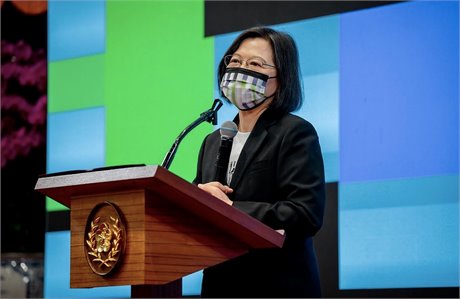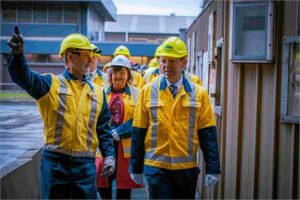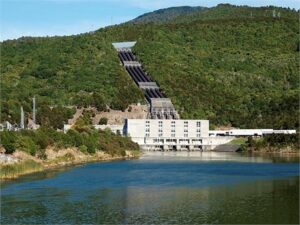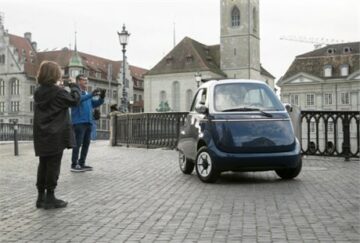 |
| Taiwan president Tsai Ing-wen |
When you open your Uber app in Taiwan the first thing you notice is that you not only get to choose between different Uber drivers you can opt for a traditional taxi as well – often it’s the cheaper option.
The unusual arrangement is the result of a mass participation digital consultation that took place before the ride-share giant was allowed to set up shop in Taiwan.
Taiwan is one of the world’s newest democracies and it seems to have leaped-frogged the more established democracies when it comes to encouraging participation, not just in decision-making, but in solution solving.
And a key tool in the solution solving space is the hackathon. Municipalities and government ministries regularly hold hackathons where teams of ordinary citizens, students and government employees compete to come up with digital solutions to pressing problems.
The Presidential Hackathon, which was launched in 2018, opens the idea up to the world with both a national and international “track.”
Taiwan Department of Digital Democracy Network director general Eric Juang told Carbon News the hackathon would welcome entries from New Zealand.
He said it wouldn’t be the first time hackers from the two countries had collaborated. In 2018 employees of the Taiwan Water Corporation had travelled to New Zealand to take part in a hackathon looking to solve the capitall’s water leakage problem with a real time system to idenify leaks.
The theme of this year’s Presidential Hackathon is: Free the future: open, digital and green.
Ideas will be judged on their contribution to achieving net zero and the digital transformation of society.
Audrey Tang is Taiwan’s digital minister and has been the executive director of the presidential hackathon since 2018.
Tang first came to prominence during the Sun Flower protest movement in 2014 when students took over the country’s parliament in protest at a trade agreement with China.
A child prodigy who set up her first start-up while still a teenager, Tang was part of a group civic-minded hackers called g0v (pronounced Gov Zero) who had been developing open source tools to improve government transparency.
g0v’s work with the protesters was noticed by the government which – to its great credit – reached out and invited the group in developing digital tools to increase democratic participation.
The Presidential Hackathon grew out of the realisation that ideas being developed at a local level or by individual government departments weren’t being adopted at a national level..
In an on-line video, Tang quotes president Tsai Ing-wen saying in her inaugural speech that democracy had traditionally been viewed as a show-down between opposing values but from now on it should be seen as a collaboration.
The hackathon is an example of that collaboration in action.
Tang says the prestige lent to the hackathon by the president ensures that the ideas of the five winning teams will be given the legislative, regulatory, fiscal and personnel support needed to make the idea reality.
Last year’s international track winner was B.E.N.Z from India with an AI proposal for making agriculture more sustainable.
Anyone can apply. Teams should be between made up of between three and five people and can come from academia, business, civil society, government, media, or any combination of those.
“What matters is that you have an open data vision for solving a specific problem, whether it is at the global, regional, national or subnational level.”
Finalists will be flown to Taiwan for the award ceremony and receive help in developing their ideas while retaining all intellectual property.
Entries open today.
- SEO Powered Content & PR Distribution. Get Amplified Today.
- Platoblockchain. Web3 Metaverse Intelligence. Knowledge Amplified. Access Here.
- Minting the Future w Adryenn Ashley. Access Here.
- Source: https://www.carbonnews.co.nz/story.asp?storyID=27499
- :has
- :is
- $UP
- 1
- 2014
- 2018
- 9
- a
- Academia
- achieving
- Action
- adopted
- Agreement
- agriculture
- AI
- All
- and
- any
- app
- Apply
- arrangement
- AS
- At
- award
- BE
- been
- before
- being
- between
- business
- by
- called
- CAN
- carbon
- cheaper
- child
- China
- Choose
- Citizens
- CO
- collaborated
- collaboration
- combination
- come
- compete
- consultation
- contribution
- CORPORATION
- countries
- country’s
- credit
- data
- Decision Making
- Democracy
- democratic
- Department
- departments
- developed
- developing
- different
- digital
- Digital Transformation
- Director
- drivers
- during
- e
- employees
- encouraging
- ensures
- established
- example
- executive
- Executive Director
- First
- first time
- Fiscal
- flower
- For
- Free
- from
- future
- General
- get
- giant
- given
- Global
- Government
- Government Employees
- great
- Green
- Group
- hackathon
- Hackathons
- hackers
- Have
- help
- hold
- HTTPS
- idea
- ideas
- improve
- in
- Inaugural
- Increase
- india
- individual
- intellectual
- intellectual property
- International
- IT
- ITS
- jpg
- judged
- Keen
- Key
- launched
- Leaks
- Legislative
- Level
- local
- looking
- made
- make
- Making
- Mass
- Matters
- Media
- more
- movement
- Municipalities
- National
- needed
- net
- network
- New
- New Zealand
- Newest
- news
- normal
- of
- on
- ONE
- open
- open data
- open source
- opens
- Option
- ordinary
- over
- parliament
- part
- participants
- participation
- People
- Personnel
- Place
- plato
- Plato Data Intelligence
- PlatoData
- president
- presidential
- Prestige
- Problem
- problems
- prominence
- property
- proposal
- protest
- reached
- real
- real-time
- Reality
- receive
- regional
- regularly
- regulatory
- result
- retaining
- s
- Said
- says
- seems
- set
- Shop
- should
- since
- Society
- solution
- Solutions
- SOLVE
- Solving
- Source
- Space
- specific
- speech
- Start-up
- Still
- Students
- Sun
- support
- sustainable
- system
- Taiwan
- Take
- teams
- teenager
- that
- The
- The Future
- the world
- their
- theme
- thing
- this year
- three
- time
- to
- today
- tool
- tools
- track
- trade
- traditional
- traditionally
- Transformation
- Transparency
- Uber
- unusual
- Values
- Video
- vision
- Water
- welcome
- WELL
- whether
- which
- while
- WHO
- will
- winning
- with
- Work
- world
- world’s
- would
- year
- Your
- Zealand
- zephyrnet
- zero












